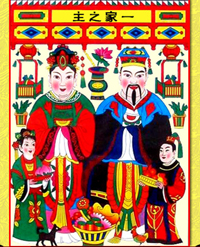Niangao, or sticky cake, is a typical traditional delight. With Spring Festival only a few days away, now is the time to enjoy these sticky, glutinous treats. According to various accounts, this cake was given either as a bribe, or simply a means of ensuring the Kitchen God's mouth was too full of cake to submit an unfavorable report.
Typical southern treat
During Spring Festival, or Chinese New Year, northerners in China enjoy dumplings, or jiaozi, but in the south, niangao is the order of the day.
Niangao, literally translated as Year Cake or Chinese New Year's cake, is made of glutinous rice. It is, traditionally, the main Chinese New Year cuisine; it is considered good luck to eat niangao during this time. In Chinese, "gao" is a homonym for high. Niangaos also called nianniangao, which is a homonym for "higher each year," symbolizing progress and promotion at work and in daily life and improvement in life year by year. There are a variety of ways to make niangao, but the main ingredient is always glutinous rice pounded or ground into a paste, then mixed with other ingredients and molded into shape, then cooked again to settle the mixture.
There are also a few variants of niangao, such as Shanghai Niangao and Canton Niangao, but they are not commonly seen outside those areas.
Pleasing the heavens
The essence of Spring Festival is the celebration of the beginning of new life. New Year's Celebrations in China are swathed in the legends and traditions. The traditional Chinese New Year's Celebration is a sticky cake offered to the Kitchen God. Spring Festival commences with the offering of a sacrifice to the Kitchen God, a deity sent from the heavens to each house to take charge of family affairs and report on what it has done in the past year.
The Kitchen God's favorite food is a steamed cake. Offering a Chinese New Year cake ensures that if he Kitchen God speaks ill of the family in heaven, the gluey cake will hold his mouth shut. This tradition seems to be an implicit pact between the Kitchen God and his devotees. According to various accounts, this cake was given either as a bribe, or simply a means of ensuring the Kitchen God's mouth was too fullof cake to submit an unfavorable report.
Zao Jun, the Kitchen God
Many Chinese homes all over the Chinese mainland, Taiwan and Southeast Asia have a picture of the Kitchen God Zao Jun hanging above the stove. Zao Jun not only watches over the domestic affairs of a family, but is a moral force in the lives of all family members. It is Zao Jun who ascends to heaven every year during the Chinese New Year to present a report to the Jade Emperor on each family member's behavior
Customarily, family members try to "bribe" Zao Jun by smearing his mouth with sugar or honey so that he may present a "sweetened" version of their deeds or misdeeds as the case may be. Zao's ascent to heaven is accomplished by burning his image: the smoke rising to the heavens symbolically representing his journey to the Jade Emperor. A new picture of him is then placed above the stove for the coming year.
In the above representation of Zao Jun, we see him and his wife flanked by two servants holding jars in which are stored the rewards or punishments for the deeds or misdeeds that have occurred during the year. Two other servants stand in the foreground: they serve both Zao Jun and the Jade Emperor and are intermediaries between the heavenly and earthly world.
The Taoist notion of yin and yang energies is symbolized by the rooster and the dog who stand guard on either side of the a jar filled with money and other riches the family hopes will come to them in the coming year.
(Beijing Today February 4, 2008)


